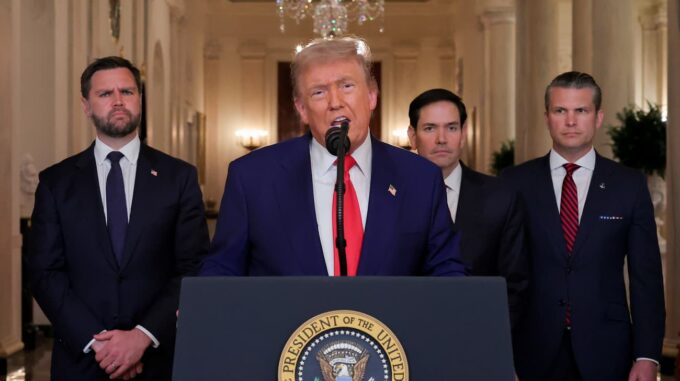Donald Trump Warns Iran: If They Reject Peace, the United States Is Ready to Strike Even More Massive and Devastating Blows

Following a bold and targeted operation that destroyed several strategic nuclear sites in Iran, U.S. President Donald Trump made a loud statement regarding Washington's current intentions in the region. Speaking at a press conference at the White House the day before, he directly warned Tehran: if Iran refuses peaceful negotiations, the United States is prepared to carry out even larger and more powerful strikes capable of destroying not only nuclear resources but also many other strategically important targets within the country. This warning came after an earlier attack on key nuclear facilities in Iran, further complicating the situation in the region and undermining any hopes for diplomatic dialogue. The news about the specific operation was officially confirmed by sources: during the press conference, Trump stated that the purpose of this special operation was to eliminate nuclear threats concentrated at sites such as Fordow, Natanz, and Isfahan — one of the central and most complex strategic points of Iran’s nuclear potential. According to him, these sites have now been completely and irreversibly destroyed, emphasizing that the goal was achieved with maximum efficiency. The report on the success of the operation was announced quite loudly and firmly: Trump warned that if Tehran is unwilling to pursue peaceful negotiations, Washington will not stop and will deliver even larger and more destructive strikes, targeting other strategically significant objectives located across the country. “It will be either peace or tragedy for Iran,” the U.S. president declared. “It is many times greater than what we have seen over the past eight days. Remember, there are still many targets left, and today’s operation was perhaps the most challenging and deadliest of all. But if Iran does not come to its senses quickly, we will start destroying other targets with pinpoint accuracy—quickly and irreversibly. Most of them can be taken out in just a few minutes.” The president also highlighted Iran’s long-standing and aggressive rhetoric, which has persisted for over 40 years. In his words, Tehran has systematically engaged in hostile statements and aggressive actions against the U.S. and its allies in the region. “Iran has been shouting all this time: ‘Death to America! Death to Israel!’,” Trump underlined. “They did not hesitate to carry out terrorist attacks, bomb explosions near roads, and maim people with bombs... That was their profession.” Trump added that the U.S. has long understood this alarming situation and aimed to avoid destructive methods unnecessarily, but now the circumstances have changed. What was carried out: At approximately 2:30 a.m. local Iranian time, the U.S. Air Force launched precise strikes against three nuclear sites — Fordow, Natanz, and Isfahan. According to official information, these targets represented key parts of Iran’s nuclear capabilities, and their destruction was carried out with maximal precision and under exemplary military instructions. The forces accomplished their mission, demonstrating U.S. resolve and strength in the region, which elicited a broad global reaction. Of course, these actions have far-reaching consequences—for Iran and for global security. U.S. authorities acknowledge that the situation could worsen further if Iran refuses to engage in diplomacy. President Trump stated that the decision now lies solely with Iran and urged Tehran to quickly pursue constructive dialogue. Meanwhile, the aggressor country, Iran, remains silent about possible retaliation, but events in the region increasingly resemble preparations for a potential new escalation. It remains to be seen what decisions Iran’s leadership will make — as ongoing conflicts and threats turn this crisis into one of the hottest and most dangerous in the Middle East and worldwide. It is known that any further development depends on diplomatic efforts and both sides’ willingness to compromise, but at present, the danger remains high, and the international community is watchfully observing the rapidly unfolding events in this multilateral conflict.

